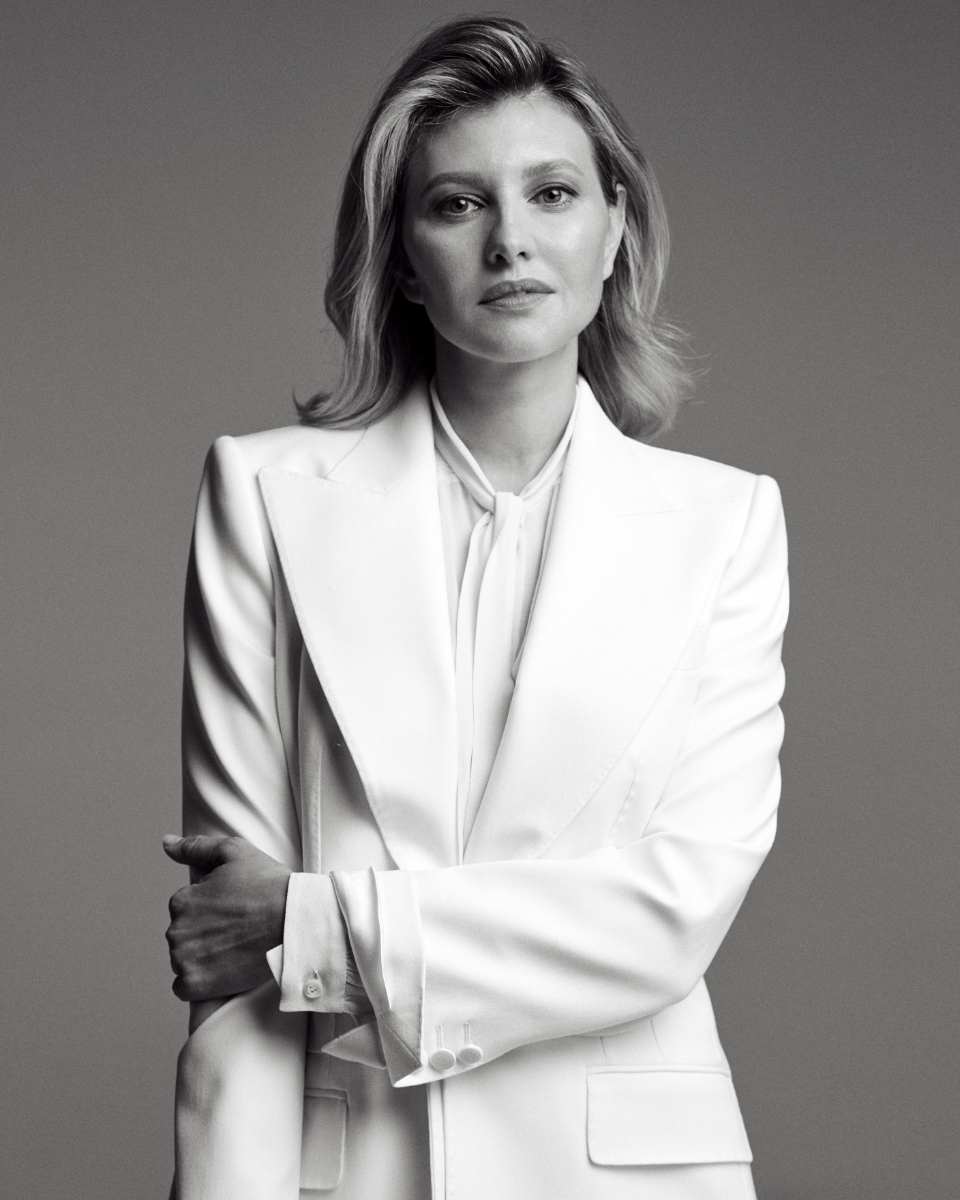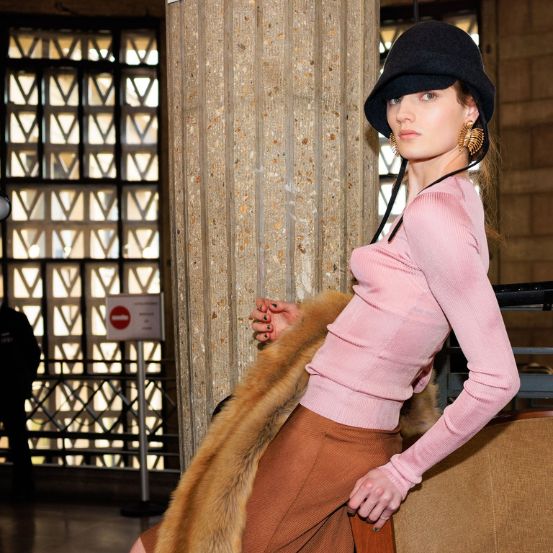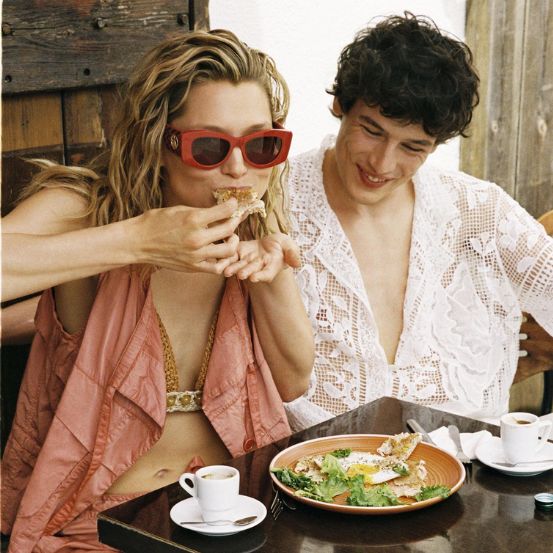Ukraine’s First Lady, Olena Zelenska, on life under siege—and how her country is moving forward.
Ukraine’s First Lady, Olena Zelenska, on life under siege—and how her country is moving forward.

Olena Zelenska em 2021. Fotografia: Stephan Lisowski para a Vogue Ucrânia
Olena Zelenska em 2021. Fotografia: Stephan Lisowski para a Vogue Ucrânia
Could you describe the earliest days of the invasion? What do you remember most clearly?
I remember the beginning very well. It was a normal working day and evening: the children returning from school, the usual household chores, preparing for the next school day… We had been tense. There had been a lot of talk, everywhere, about a possible invasion. But until the last minute it was impossible to believe that this would happen…in the twenty-first century? In the modern world? I woke up, sometime between 4 and 5 a.m., because of a clunk. I didn't immediately realize it was an explosion. I didn't understand what it could be. My husband wasn’t in bed. But when I got up, I saw him at once, already dressed, in a suit as usual (this was the last time I’d see him in a suit and a white shirt—from then on it was military). "It started." That's all he said. I wouldn’t say there was panic. Confusion perhaps. "What should we do with the children?” "Wait,” he said, “I'll let you know. Just in case, gather essentials and documents.” And he left the house.
Your son is 9 and your daughter is 17. What did you say to them about what was happening?
There is no need to explain anything to children. They see everything, as does every child in Ukraine. Surely, this is not something that children should see—but children are very honest and sincere. You can't hide anything from them. Therefore, the best strategy is the truth. So, we’ve discussed everything with my daughter and son. I have tried to answer their questions. We talk a lot, because to say what hurts, to not remain silent within yourself—this is a proven psychological strategy. It works.
You have obviously been thinking about the safety of your family–even as you have been seeing violence being done to ordinary Ukrainian citizens. Can you describe your mix of personal and civic feelings?
The war immediately combined the personal and public. And this is probably the fatal mistake of the tyrant who attacked us. We are all Ukrainians first, and then everything else. He wanted to divide us, to shatter us, to provoke internal confrontation, but it is impossible to do this with Ukrainians. When one of us is tortured, raped, or killed, we feel that we all are being tortured, raped, or killed. We do not need propaganda to feel civic consciousness, and to resist. It is this personal anger and pain, which we all feel, that instantly activates the thirst to act, to resist aggression, to defend our freedom. Everyone does this the way they can: Soldiers with weapons in their hands, teachers by continuing to teach, doctors by conducting complex surgeries under attacks. All have become volunteers—artists, restaurateurs, hairdressers—as barbarians try to take over our country. I’ve seen this raise the deepest patriotic feelings in our children. Not only my children, but all the children of Ukraine. They will grow up to be patriots and defenders of their homeland.
How have you coped emotionally? Are there any friends or sources of support you have turned to during this time? How much contact did you have with your husband in those early weeks of the war? And now?
At the beginning there was no time for emotions. It was necessary to take care of the children, their emotional states. So I tried to be confident, smiling, energetic, explaining to them that, yes, it is necessary to go down to the basement and this is why you cannot turn on the light. I tried to optimistically answer their question, “When will we see dad?” “Soon.” In those first days I hoped that we might be able to stay with him. But the president's office had become a military facility and my children and I were forbidden to stay there. We were ordered to move to a safe place—if, in Ukraine, it is possible to find a safe place now… Since then, we have been communicating with Volodymyr only by phone.
“This is probably the fatal mistake of the tyrant who attacked us. He wanted to divide us, to shatter us, to provoke internal confrontation, but it is impossible to do this with Ukrainians”
What challenges have women in your country, in particular, faced as Russia invaded?
I want all the people in the world to understand that Ukrainian women lived a peaceful, modern life, the way Vogue’s readers in every country live. Actually, they were your readers, because there is Vogue Ukraine. They were not preparing bomb shelters for missile attacks. But from the first days, after Russian missiles began hitting residential buildings in different cities, it became clear that Russia does not have mercy for peaceful lives. All Ukrainians stopped feeling safe. We had to learn how to quickly gather loved ones at the sound of the siren and go down to the subway or the nearest basement. By the third day of the war, a Ukrainian child had been born in a bomb shelter. And after that thousands of women have had to give birth in bomb shelters, because we’ve seen what can happen to maternity hospitals like the one in Mariupol, which the Russians bombed. There is a problem treating children as well, especially those with serious diseases. Mothers and grandmothers have been living in hospitals with such children for months. And now we all must take them abroad for treatment. Women had to leave occupied cities—such as Bucha and Gostomel, risking their lives under fire—with children and the elderly, often on foot, often without men, because men would not be released by the occupiers. The world saw this in early March as people crossed an exploded bridge from the city of Irpin. And now as these cities are de-occupied, we know more about what Ukrainian women have faced: complete insecurity, the threat of violence. An international investigation must have a say here. And how many women remain in the still-occupied cities of Kherson, Melitopol, Berdyansk? They can't even tell their relatives what is happening to them, because there is no connection, or any contact they make would be traced. There are tens of thousands of women with children in the ruins of Mariupol. And one can only imagine what a nightmare they are going through, searching for food under fire for a month now, because humanitarian aid is not allowed in. Some four million women and children have migrated and are now in other countries. And being a migrant is hard both mentally and physically. Because you must start all over again. What is it like to live when you can’t even wear your personal clothes? How to explain to a child why she is not sleeping in her bed? This is a test you would not wish on anyone.
Was there a specific woman’s story–among so many–that you might tell?
I can tell dozens of such stories. For example, after the de-occupation of the Kyiv region, we heard the story of a doctor, Iryna Yazova, who had remained in Bucha. She rescued neighbors and strangers, who were seeking shelter and treatment from Russian gunshot wounds. She anesthetized and bandaged them. She even helped to deliver a baby—without light, water, and gas, in a house under fire. The story of her daily acts of bravery have now been told by neighbors who owe her their lives. There is also the story of a mother in Kyiv—Olga, who covered her 2-month-old daughter when a rocket hit her apartment building. Or the story of the Chernihiv orphanage teacher, Natalia, who lived with 30 children (one of whom was her own) in a basement. She fed and cared for them, and then found a vehicle and, under fire (because Chernihiv has been under fire from the very beginning), took them to a safe place. There are almost as many such stories as there are Ukrainians. I launched a Telegram channel inviting Ukrainians to share their war experiences. Every personal story is the history of our country.
The destruction of Ukrainian cities and towns has been horrific. Was there an early attack that struck you as indicative of how far Putin and the Russian army were willing to go? Was it the attack on the maternity hospital in Mariupol? Was there a line that you felt was crossed early on?
The line you are talking about was crossed on the first day—the first! Russia then (as now) has lied when it has said it is targeting only military sites. In fact, on February 24th their attacks killed a civilian gas service dispatcher named Svetlana, in Chuguev, who was simply doing her job. That was the first day! In the following days we lost children. They died from shell fragments in their hometowns. We have lost more than 200 children. So, each case was indicative for us. Blocked, destroyed Mariupol is our terrible pain. That continues. And the Kyiv region has become horrible—that’s what we’ve seen as the Russian army has retreated. The world has learned the name Bucha. This is one of the once-beautiful towns near the capital—but the same horrors can be seen in dozens of villages and towns in Kyiv region. People killed on the street. Not military—civilians! Graves near playgrounds. I can't even describe it. It makes me speechless. But it is necessary to look at it. I hope we are not the only ones who see the message Russia is sending. This message is not only addressed to us. This is their message to the world! This could be what happens to any country that Russia does not like.
You and your husband have implored nations to do more to respond to this invasion—and specifically you have called on the U.S. to impose a no-fly zone. Do you still feel that is the right action for the U.S. to take?
Yes, we have asked, officially and unofficially. As has every Ukrainian, on their social networks, at protests. When the Russian siege of Mariupol began, it became clear that Russia was not only firing rockets, but also bombing from the air. One of the bombs fell on a theater where more than a thousand people were hiding. Some three hundred people died there. I know, for example, of a family that lost their son, their daughter, and a granddaughter. Only the grandparents and the eldest girl remained alive. How do they live after that? We asked to close the sky above us so that Ukrainians would not perish. But NATO considered this to be a direct conflict with Russia. So, can I say now that Russia alone is to blame for further deaths? Rhetorical question. You ask if this is the right move for the United States. I say—and this is not only true for the United States—give a tough answer to the actions of the aggressor or the aggressor will be encouraged to move. Russia knows that the West will not cover the sky, and this fact encourages it to commit atrocities. The democratic world must be united and give a tough response, thus showing that in the twenty-first century there is no place for killing civilians and encroaching on foreign territory. I saw a caricature of NATO and world organizations watching a house falling with UKRAINE written on it. Perhaps this was an exaggeration—because Ukraine does get weapons. But we also need protection! It is true that such protection is given to those who have gone abroad. Millions of our women and children now receive help from both governments and millions of ordinary people in the European Union. I am infinitely grateful for this.
“The main thing is not to get used to the war—not to turn it into statistics. Continue going to protests, continue to demand that your governments take action. Ukrainians are the same as you”
What do you make of the recent moves by the Russian army. Do you see any signs that Russia is willing to de-escalate?
What matters here is not what I think, but what is really happening. Honestly, no one in Ukraine believes any statement of the aggressor. And de-escalation is not yet visible. The Russians withdrew from the Kyiv region, but intensified their attacks in the Donetsk and Odessa regions.
What can ordinary citizens do to help Ukrainians?
The main thing is not to get used to the war—not to turn it into statistics. Continue going to protests, continue to demand that your governments take action. Ukrainians are the same as you, but just over a month ago, our lives changed radically. Ukrainians did not want to leave their homes. But so often they did not have homes left. Ukrainians have long moved visa-free within Europe—many could travel, and have traveled. Most of our people have been abroad before. But they didn't plan on being refugees. So: Treat them as one of your own. The main thing these mothers and children dream of is to return home, to reunite their families. So help them adapt, please—home, work, school for children—until they can return. Also, everyone in the world should know that Russia is conducting a massive information war on the world stage. Any information from them should be treated with caution and critical thinking. In recent days, we have seen several pro-Russia actions in Germany, Greece, and other countries in support of the war. These are being done by Russians. A normal Russian should feel only ashamed of his country’s actions, of the atrocities its army is committing. I never call for violence. But those who support the war must not be trusted.
What is your life like now?
I now live the same way as other Ukrainians. We all have one great desire: to see peace. And I, like every mother and wife, constantly worry about my husband and do everything to keep my children safe.
And what gives you hope?
My family—just like every Ukrainian—and my compatriots: incredible people who organized to help the army and help each other. Now all Ukrainians are the army. Everyone does what they can. There are stories about grandmothers who bake bread for the army just because they feel this call. They want to bring victory closer. That is what Ukrainians are like. We all hope for them. We hope for ourselves.
Is there a particular moment from the last month that you know you will never forget?
About a week after the start of the war, I was phoning around to try to find out where my relatives were and whether they were alive. And in one moment, I realized that I didn't know if I would ever see them again—those I love, my beloved people! That was probably the first time I cried—the first time I let go of my emotions. I couldn't stand it. I will always remember my acquaintances and friends, all the men and boys in military uniforms. I will always remember how brave my female friends are! What these women—fragile and elegant in times of peace—are able to do when there is war around! Their stories inspire me. I am so proud of them. And I dream to see them again.
This interview, conducted via email in collaboration with Vogue Ukraine, has been edited for clarity.
Most popular
.jpg)


Há um mês que bebo chá verde em vez de café: eis o que torna esta mudança tão saudável
24 Mar 2025
Relacionados

Bullet bra: a tendência de sutiãs que dominou a Semana de Moda de Paris
31 Mar 2025

.jpg)


